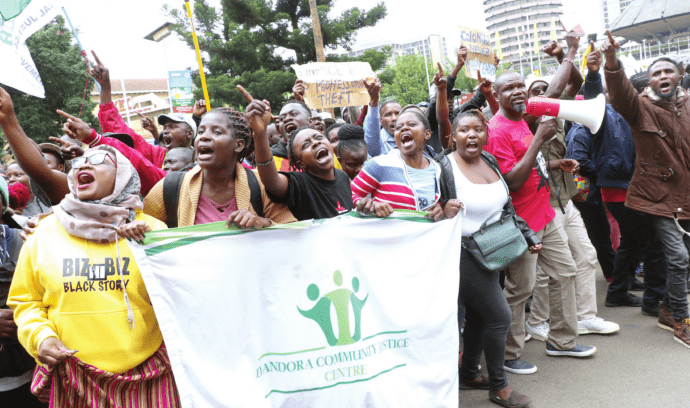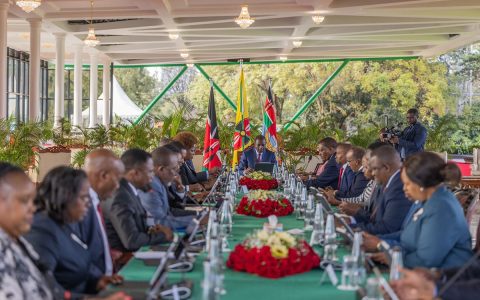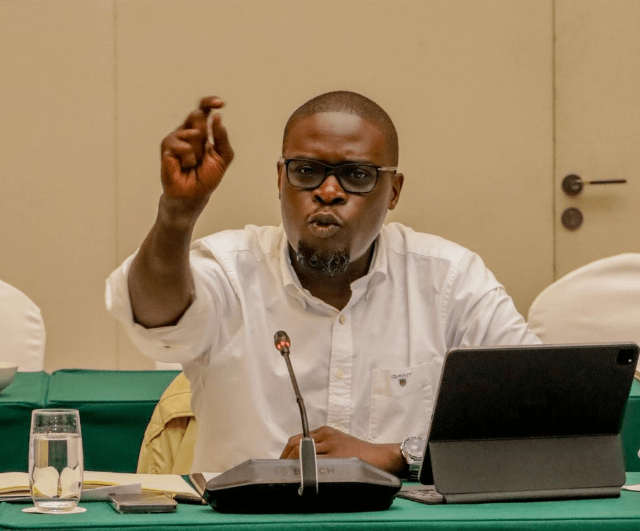Ruto makes many promises but keeps few

The apparent falling-out between President William Ruto and his deputy Rigathi Gachagua, which has exposed the DP to ridicule from some politicians, has unmasked the head of state as a man who hardly keeps his word.
While serving as Deputy President, Ruto, who had fallen out with his boss President Uhuru Kenyatta, had vowed to protect his deputy from humiliation by junior government and party officials.
“I will not allow my Deputy President to be humiliated by junior staff. I have committed myself in writing that there are responsibilities my deputy will carry,” Ruto said back then.
“Even when we had a Vice President, the Vice President always chaired the Cabinet committees. I want to promise you that my Deputy President will be a very busy person.”
Silent
But for the past month, Gachagua has been on the receiving end from some Kenya Kwanza politicians perceived to have President Ruto’s ear, forcing the DP to claim that a few individuals around the head of state were frustrating him.
“The problem is a few leaders from this region [Rift Valley] who have proximity to the President ndio wanakoroga siasa ya huko kwetu, kudanganya watu waanze kupanga mambo ya 2032. That is the problem there,” Gachagua said at a church service in Kericho county.
President Ruto has not said a word as his close allies work on Gachagua for ostensibly calling for Mt Kenya region unity.
However, high-profile sources close to the President indicated to People Daily that the DP is a victim of what other Mt Kenya leaders find to be a patronising attitude.
Gachagua’s fielding of candidates against politicians opposed to him has been cited as among the key reasons for the growing discontent in Mt Kenya.
Other critics, especially those from the Rift Valley, are said to be uncomfortable with any attempt by Gachagua to project Ruto as a co-presidency.
Overseas trips
Ruto’s trip to South Korea has also exposed him as a man who does not keep his word after he vowed not to be summoned by leaders abroad.
The President had last year received a round of applause during an event in Nairobi when he castigated trips made by African leaders abroad for summits to discuss matters concerning Africa, instead of holding them on the continent.
“The decision we have made as AU is that going forward, if there is going to be a discussion between Africa and any other country, we would send the chair and the bureau,” Ruto said in the early days of his presidency. “That is the position I am taking as the President of Kenya.”
This week, President Ruto was among 48 African leaders who gathered in Seoul for the first-ever Korea-Africa Summit.
During his inauguration, he also promised to respect the rule of the law and human rights on demolitions of structures.
“We want to make sure that we are an orderly, humane society that respects the rights of everybody regardless of who they are and their financial status. We are equal in the eyes of the Constitution,” the President had said then.
Demolitions
Yet it is the same President who recently directed the Ministry of Interior to demolish structures in Mathare, Nairobi, and other areas bordering the Nairobi River in a bid to protect riparian land.
Ruto is first and foremost a politician who says things for the sake of pleasing the crowd, said professors Macharia Munene of USIU-Africa and Henry Manyora of the University of Nairobi.
“As a politician, there is nothing unique in saying one thing and doing the opposite. On the other hand, he has found himself held prisoner by international agencies such as the World Bank, IMF and Western countries,” Macharia said.
“Because of these two factors, he has become a man of doublespeak.”
Ruto may have made certain commitments out of ignorance because he did not know the complexities of running a government, said Manyora.
“But after ascending to the throne, he found himself captive of some forces, both local and international,” he said. “Most people will always underrate the power of outside forces before they get to power, but once inside, they do not know how to overcome those forces.”
When Ruto was crisscrossing Kenya campaigning ahead of the 2022 presidential election, he promised to make a raft of changes that he said were meant to make Kenya an exceptional nation.
Cost of living
During the election campaign, Ruto promised to fix an economy hobbled by corruption and ineptitude. He promised to entrench good governance and place the poor at the centre of economic policy. He pledged to address ethnicised politics and to uphold constitutionalism and the rule of law.
But now the cost of living is higher after a steep increase in fuel prices and a drop in the value of the Kenyan shilling. Ruto’s government has imposed new taxes and increased others, ostensibly to reduce or remove the need for external borrowing.
Political analysts say he is doing the opposite of what he promised Kenyans.
“Remember the famous maxim - you campaign in poetry but you govern in prose. Dr Ruto did not mean whatever he promised during the campaigns because all he wanted were votes,” Manyora said.
President Ruto, while advancing the hustler narrative, clearly stated that part of his administration’s agenda was to make business credit available and affordable to small-scale traders who, in times gone by, were at the mercy of loan sharks.
As things stand today, the government continues to borrow heavily from local markets, squeezing out the same small-time traders.
This has been compounded by the Central Bank, which has set the Central Bank Rate rate at 13 percent, signalling expensive loans ahead. Small-time traders have been effectively squeezed out of the table.
The Kenya Kwanza administration borrowed Sh108 billion between January and April this year alone, according to a report from the National Treasury.
The “Hustler Government” had promised “hustlers” a weird kind of utopia - a coming regime of interest-free loans, money without cost. However, with time, Kenya Kwanza luminaries saw the light, and then doubled down on earlier promises of interest-free money and informed the hustlers as much.
Tax-weary
They promised a “Hustler Fund” that would provide money with low interest rates to help small businesses. But there was another small problem - the amount of money that borrowers would get at first would only be Sh500.
In March last year, tax-weary and inflation-hit ordinary Kenyans were promised by the President that from June 2023, an 8 per cent tax levied on cooking gas would be removed to make cooking gas more affordable.
Indeed, the VAT charged on cooking gas was removed in April 2024 by the signing into law of the Statute Law (Miscellaneous Amendments) Bill 2024. The President also promised, amid ululations, that the cost of cooking gas would be reduced from around Sh2,800 to Sh500 or Sh300 by June 2023. But the price of gas remains more or less the same. Who once said a promise is a debt?



